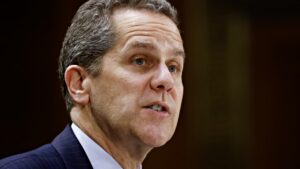Michael Barr Steps Down: What This Means for the Future of Bank Regulation
In a significant shift in the landscape of American financial regulation, Michael Barr, the Federal Reserve’s vice chair for supervision, has announced his resignation effective February 28. This pivotal move is set against the backdrop of the upcoming presidency of Donald Trump, who will soon have the opportunity to appoint a successor. Here at Extreme Investor Network, we aim to provide you with unique insights on this transition and how it may affect your investment strategy.
Understanding the Context
Barr’s resignation comes at a time when there is palpable tension between incoming administrations and regulatory frameworks. President-elect Trump has hinted at a desire for a more bank-friendly regulatory environment, which may clash with the more stringent policies that Barr supported during his tenure. Barr himself recognized the potential for conflict, stating, "The risk of a dispute over the position could be a distraction from our mission." He expressed his intent to fulfill his duties more effectively as a governor on the Federal Reserve board, where he will remain until 2026.
The Implications for Investors
The impact of Barr’s resignation has been immediate, as evidenced by the rally in bank stocks. Following the announcement, the SPDR S&P Bank ETF, a key indicator of the banking sector’s health, gained over 1%. This spike signals a market that anticipates a more lenient regulatory environment that could enhance bank profitability and stability.
Investors should keep a close eye on the nomination process for Barr’s successor. Trump will need to choose from the existing board of seven members, making the stakes even higher for those closely aligned with either end of the regulatory spectrum. The new appointee could significantly shape the future policies governing the banking industry, especially as the Federal Reserve revises rules under what is being termed the "Basel Endgame." This has been a contentious topic within financial circles, and the new vice chair’s stance on these regulations will be critical.
A Look Back: Barr’s Tenure
Barr’s term was not without challenges. He oversaw a turbulent period, including the shocking collapses of institutions like Silicon Valley Bank in early 2023, which led the Fed to implement emergency liquidity facilities. This serves as a reminder that the financial system remains fragile. As the incoming administration seeks to unwind some regulations established post-2008 financial crisis, the potential for another crisis looms, particularly if oversight is weakened.
What To Expect Next
With Barr’s impending exit, speculation is rife about who will fill his shoes. Institutions and investors alike should prepare for a shift in regulatory philosophy that could favor aggressive growth strategies for banks, possibly at the expense of long-term stability. The selection process for Barr’s replacement will be a significant catalyst for market movements and could also trigger broader implications for credit availability and lending practices.
Conclusion: Position Yourself For Change
As we witness this seismic change in financial regulation, it’s essential for investors to be proactive. Carefully consider how shifts in the regulatory landscape could impact your investment strategy. At Extreme Investor Network, we are dedicated to providing you with the most relevant and timely information to navigate these transitions effectively.
Stay tuned for further updates on this story and its implications for the financial markets, and ensure you’re equipped with the insights needed to make informed investment decisions. With the right strategies, you can thrive in an environment ripe with both challenges and opportunities.

